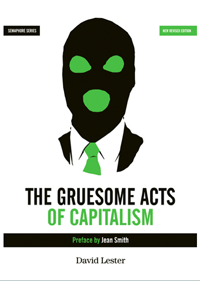
- The Gruesome Acts of Capitalism
- Arbeiter Ring Publishing
The Gruesome Acts of Capitalism is a small chapbook compendium of statistics and short essays put together by Vancouver musician and artist David Lester, that could just as easily have been called Some Gruesome Facts of Capitalism. Taken as a whole (admittedly a small, 112-page whole), Lester's book (recently reissued) is an extreme example of the current trend to reduce ideas into disconnected, random factoids that are easy to consume but lead to more noise than understanding -- becoming, instead, a barrage of unrelated, atomized and decontextualized snippets. Whatever its shortcomings, its heart is certainly in the right place, and with royalties going to the Canadian Centre for Victims of Torture, there are certainly worse ways to spend 11 bucks. But substituting free-floating facts for real discourse is no small thing.
My uncle used to occasionally tease his youngest sister, my dear aunt, for a blustery sentence that she once frustratedly exclaimed in the middle of a fit of panic and confusion: "Don't confuse me with the facts!" A while later, he quietly recanted, explaining that he'd come around to sharing her suspicion -- that people can find facts to prove anything. And that's a fact -- witness a little-known debacle called the war in Iraq to see what charming "facts" people can come up with, fill vials with, and wave in front of the United Nations.
In the era of mass communication, we've been flooded with information that we only half understand, a phenomenon captured perfectly and jarringly in Don DeLillo's novel White Noise. The onset of Google, Wikipedia, blogs, "Fact of the Day" features on the TV listings channel and the like have the same effect on knowledge as the massive, uncontrolled printing of money: the value of the currency drops and the detection of counterfeit bills becomes harder. So people, like Stephen Colbert's Report persona, turn to their "guts." Paradoxically, the tumour that is truthiness is built with the cancer cells of devalued fact.
When stats are celebrities
It's a state of affairs captured hilariously on NBC's The Office, when office manager Michael Scott (played by Steve Carrell, who like Colbert, is a Daily Show veteran) tries to drive the fear of drugs into his employees:
Michael: Look to your left. Okay, now look to your right. One of those people will die from drugs at some point in their lives...More people will use cocaine this year than will read a book to their children.
Laconic employee: Where did you get these statistics?
Michael: Why Stanley? Do these statistics scare you?
Laconic employee: They do not.
Even though they're often disconnected, Gruesome Acts does showcase many stats and figures that might be new to many people: "Globally the number one occupation for disabled people is begging," is one. Or "Elizabeth Paige Laurie, an heiress to the Wal-Mart fortune, was under investigation at the University of Southern California over claims that she paid a fellow student $20,000 to complete her coursework," is another. And it confirms facts I felt I already knew, intuitively, or that I was pretty sure I'd heard before someplace: "In the U.S. in 1998, almost 70% of wealth was in the hands of 10% of the population," or "A child dies of starvation every seven seconds according to the World Food Programme," a fact curiously then attributed not to the World Food Programme but to The Guardian Weekly. (In fact, The Guardian Weekly shows up as a source like peanuts in a can of mixed nuts -- way, way more frequently than anything else that might be sprinkled throughout.)
And while the barrage is a problem, at least the author does properly and helpfully attribute all of the sources. These are no longer just noisy facts and figures out of the ether anymore; they're from somebody or someplace verifiable, and therefore all the more real. In addition, Lester provides short essays about activists and artists, which point us to his politics and morality. He chooses figures from history -- Emma Goldman, for example -- who fought for positive change. And at the end of the book, he provides a list of artists and organizations making a difference. So by anchoring this litany of gruesome acts within a morality and a politics, Lester's chapbook saves itself from being simply a laundry list of horrors, or a terrifying and demoralizing leftist almanac. It's still a fairly superficial work, but one carried out with the best of intentions.
So while the book might have fallen into the trap of adding to the DeLilloan white noise -- and it does come close -- Lester's The Gruesome Acts of Capitalism stays away from the worst extremes of the overuse of disconnected facts, a tendency that Homer Simpson epitomized when he told a news anchor during a televised debate: "Oh, people can come up with statistics to prove anything, Kent. Fourteen percent of all people know that."




